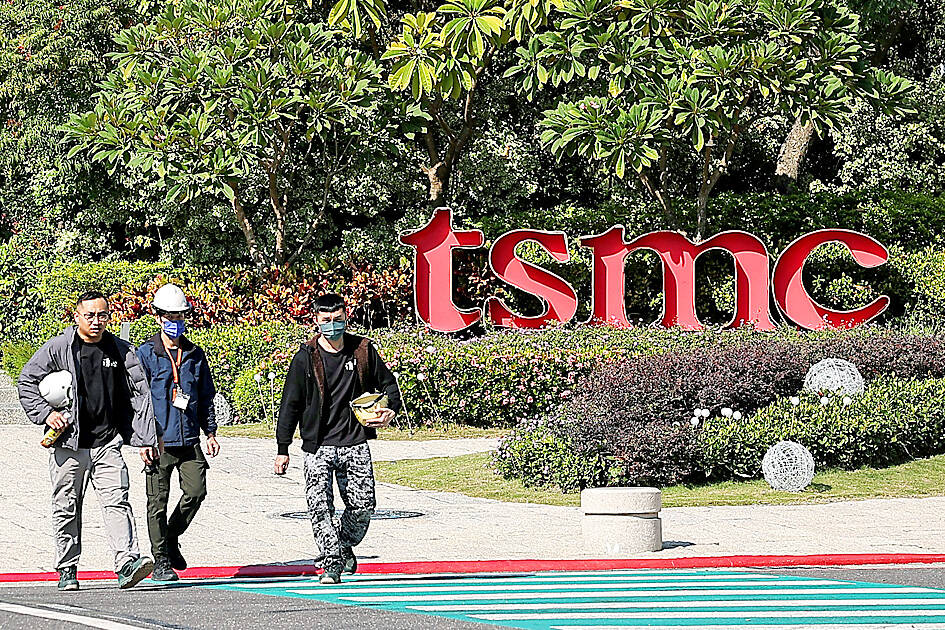Taiwan Semiconductor Manufacturing Co (TSMC, 台積電) applied for the most patents of any company in Taiwan for the ninth consecutive year last year, data released on Saturday by the Intellectual Property Office showed.
The office said in a statement that TSMC filed 1,412 invention patent applications last year, down 28 percent from a year earlier, but still the most among all the patent applicants in Taiwan.
The office said the drop in TSMC’s filings largely reflected the contract chipmaker’s patent development strategies.

Photo: Ann Wang, Reuters
Under Taiwanese law, patents are categorized into three groups — invention, utility model and design — with invention patents considered the most important for new technologies.
DRAM chip supplier Nanya Technology Corp (南亞科技) filed the second-most patents at 466 invention patents, up 25 percent from a year earlier.
Rounding out the top 10 Taiwanese invention patent applicants were flat-panel maker AUO Corp (友達) with 425 applications, down 5 percent; the Industrial Technology Research Institute (工研院) with 356, up 15 percent; flat screen producer Innolux Corp (群創) with 328, up 1 percent; artificial intelligence server maker Inventec Corp (英業達) with 321, up 6 percent; communication network IC designer Realtek Semiconductor Corp (瑞昱) with 309, up 14 percent; PC brand Acer Inc (宏碁) with 277, down 5 percent; iPhone assembler Hon Hai Precision Industry Co (鴻海) with 259, up 93 percent; and smartphone IC designer MediaTek Inc (聯發科) with 239, down 56 percent.
Hon Hai had the highest increase in invention patent applications in Taiwan last year, the Intellectual Property Office said.
Among foreign companies in Taiwan, American semiconductor equipment supplier Applied Materials Inc had the most invention patent applications last year after filing 950 applications, up 29 percent from a year earlier.
That helped Applied Materials replace South Korea’s Samsung Electronics Co, which filed 894 invention patents, down 8 percent from a year earlier, to become the top foreign applicant, the office said.
South Korean e-commerce operator Coupang Corp was third after filing 698 invention patents, up 54 percent from a year earlier ahead of Japanese semiconductor and display production equipment supplier Tokyo Electron Ltd, with 661, up 21 percent, and American smartphone IC designer Qualcomm Inc, with 660, up 3 percent, the data showed.
Rounding out the top 10 foreign applicants were Japanese electrical product maker Nitto Denko Corp, with 417, down 13 percent; Dutch semiconductor equipment supplier ASML Holding NV, with 344, up 11 percent; Japanese semiconductor silicon provider Shin-Etsu Chemical Co, with 279, up 22 percent; US wafer-fabrication equipment supplier Lam Research Corp, with 276, up 12 percent; and Japanese semiconductor equipment supplier Screen Holdings Co, with 253, down 2 percent.

SELL-OFF: Investors expect tariff-driven volatility as the local boarse reopens today, while analysts say government support and solid fundamentals would steady sentiment Local investors are bracing for a sharp market downturn today as the nation’s financial markets resume trading following a two-day closure for national holidays before the weekend, with sentiment rattled by US President Donald Trump’s sweeping tariff announcement. Trump’s unveiling of new “reciprocal tariffs” on Wednesday triggered a sell-off in global markets, with the FTSE Taiwan Index Futures — a benchmark for Taiwanese equities traded in Singapore — tumbling 9.2 percent over the past two sessions. Meanwhile, the American depositary receipts (ADRs) of Taiwan Semiconductor Manufacturing Co (TSMC, 台積電), the most heavily weighted stock on the TAIEX, plunged 13.8 percent in

A wave of stop-loss selling and panic selling hit Taiwan's stock market at its opening today, with the weighted index plunging 2,086 points — a drop of more than 9.7 percent — marking the largest intraday point and percentage loss on record. The index bottomed out at 19,212.02, while futures were locked limit-down, with more than 1,000 stocks hitting their daily drop limit. Three heavyweight stocks — Taiwan Semiconductor Manufacturing Co (TSMC, 台積電), Hon Hai Precision Industry Co (Foxconn, 鴻海精密) and MediaTek (聯發科) — hit their limit-down prices as soon as the market opened, falling to NT$848 (US$25.54), NT$138.5 and NT$1,295 respectively. TSMC's

TARIFFS: The global ‘panic atmosphere remains strong,’ and foreign investors have continued to sell their holdings since the start of the year, the Ministry of Finance said The government yesterday authorized the activation of its NT$500 billion (US$15.15 billion) National Stabilization Fund (NSF) to prop up the local stock market after two days of sharp falls in reaction to US President Donald Trump’s new import tariffs. The Ministry of Finance said in a statement after the market close that the steering committee of the fund had been given the go-ahead to intervene in the market to bolster Taiwanese shares in a time of crisis. The fund has been authorized to use its assets “to carry out market stabilization tasks as appropriate to maintain the stability of Taiwan’s

In a small town in Paraguay, a showdown is brewing between traditional producers of yerba mate, a bitter herbal tea popular across South America, and miners of a shinier treasure: gold. A rush for the precious metal is pitting mate growers and indigenous groups against the expanding operations of small-scale miners who, until recently, were their neighbors, not nemeses. “They [the miners] have destroyed everything... The canals, springs, swamps,” said Vidal Britez, president of the Yerba Mate Producers’ Association of the town of Paso Yobai, about 210km east of capital Asuncion. “You can see the pollution from the dead fish.